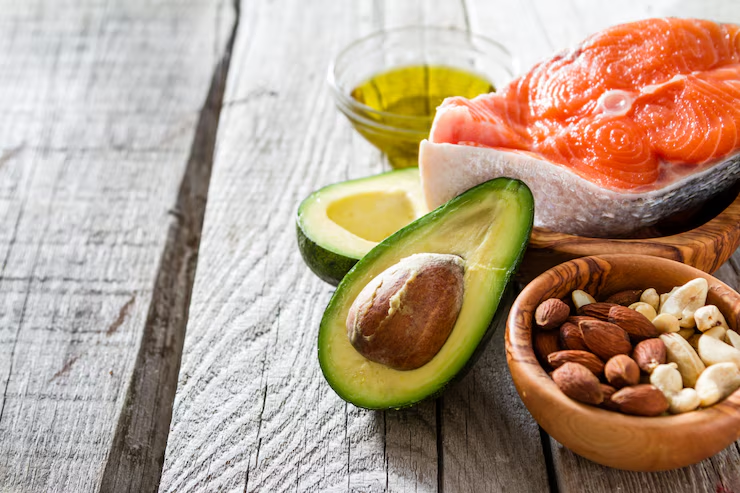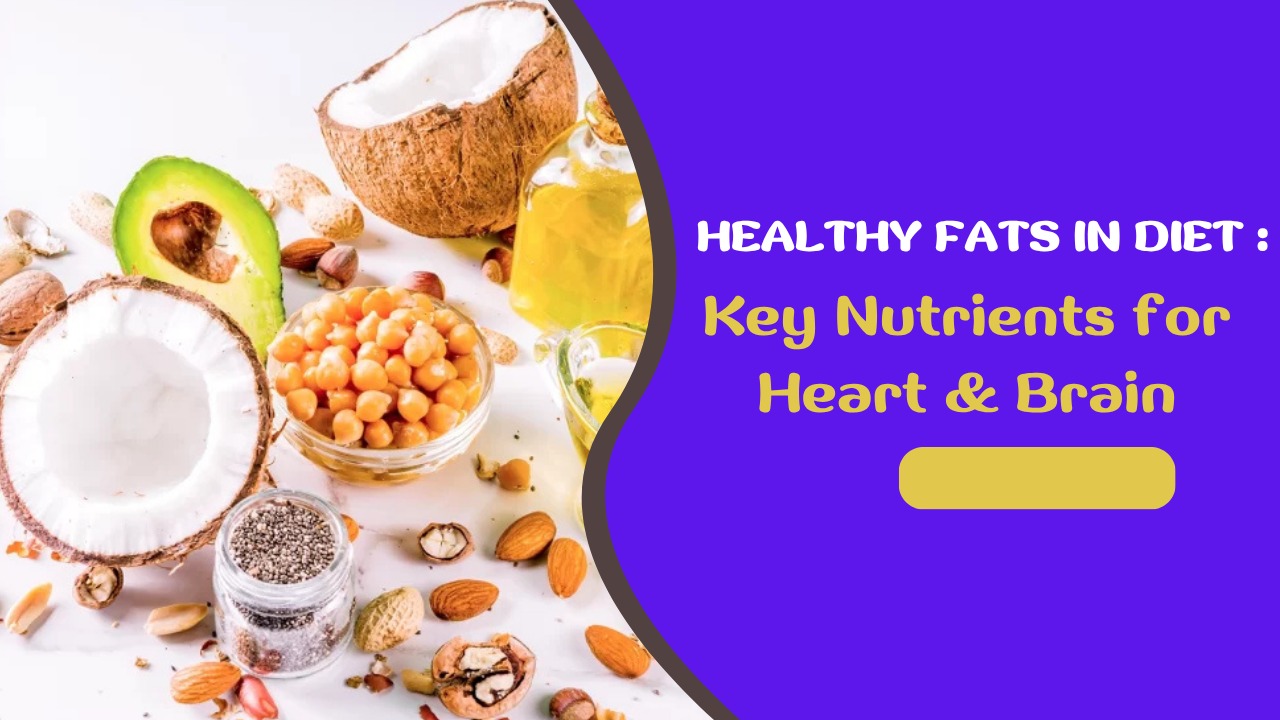For many years, the word “fat” has been linked to negative ideas like unhealthy eating, weight gain, and various diseases. This has caused many people to avoid all types of fat. However, not all fats are harmful. In fact, our bodies need certain fats to work properly and stay healthy.
There are different types of fats, and some are actually good for us. Healthy fats in diet help support brain function, reduce inflammation, and keep our hearts strong. These good fats can also help lower bad cholesterol levels and support overall wellness when eaten in the right amounts.
Including healthy fats in diet is also important for helping the body absorb certain vitamins like A, D, E, and K. These fats also provide energy and help keep skin and hair healthy. Choosing sources such as nuts, seeds, avocados, and oily fish can be a smart and nutritious way to add healthy fats to your daily meals.
This article delves into the importance of healthy fats, their types, benefits, sources, and how you can incorporate them into your daily diet for optimal health.
What Are Healthy Fats ?

Fats are a macronutrient, one of the three primary nutrients alongside carbohydrates and proteins. They provide energy, aid in cell structure, and help in the absorption of certain vitamins. However, not all fats are the same.
Types Of Fats
Saturated fats are mostly found in animal-based foods such as fatty cuts of meat, butter, and full-fat dairy products like cheese. While small amounts of saturated fat can be part of a balanced diet, consuming too much over time may raise cholesterol levels and increase the risk of heart disease and stroke. It’s important to limit these fats and choose healthier options when possible.
Trans fats are a type of fat that are artificially produced during food processing, often found in baked goods, fried items, and some margarine spreads. These fats are considered harmful because they not only raise bad cholesterol (LDL) but also lower good cholesterol (HDL). Regular intake of trans fats has been linked to serious health problems like cardiovascular disease and inflammation, so they should be avoided completely.
In contrast, unsaturated fats are known as healthy fats. They include monounsaturated fats (MUFA) and polyunsaturated fats (PUFA), which support heart health, brain function, and overall well-being. Including these healthy fats in diet can offer many long-term health benefits.
Types of Healthy Fats
Monounsaturated Fats (MUFA)
Monounsaturated fats are an important part of healthy fats in diet and are especially known for their benefits to heart health. These fats help reduce the levels of bad cholesterol (LDL) in the blood, which lowers the risk of heart disease and stroke.

At the same time, monounsaturated fats can help raise good cholesterol (HDL), supporting better blood flow and overall cardiovascular function. This balance between good and bad cholesterol plays a key role in maintaining heart health over time.
In addition to heart benefits, monounsaturated fats are also rich in antioxidants. These powerful compounds help the body fight against oxidative stress, which can damage cells and lead to chronic health problems. Including healthy fats in diet through sources like olive oil, nuts, and avocados can be a simple and effective way to boost overall wellness.
Sources of Monounsaturated Fats:
Olive oil
Avocados
Nuts (such as almonds, walnuts, and cashews)
Seeds (such as sesame seeds and pumpkin seeds)
Nut butters (preferably without added sugars or oils)
Polyunsaturated Fats (PUFA)
Polyunsaturated fats are a key part of healthy fats in diet and are considered essential fats. This means our bodies cannot produce them on their own, so we must get them from the foods we eat. These fats are necessary for proper body function and overall well-being.

Polyunsaturated fats include omega-3 and omega-6 fatty acids. Both types are important for brain function and play a major role in keeping the nervous system healthy. They also help regulate mood, memory, and mental performance.
In addition, these healthy fats in diet support the body’s ability to control inflammation and maintain healthy cells. Omega-3 fats, in particular, have been linked to reduced risk of heart disease. You can find polyunsaturated fats in foods like fatty fish, flaxseeds, walnuts, and sunflower oil, making them a valuable addition to a balanced diet.
Omega-3 fatty acids are particularly well-known for their heart-boosting benefits. They help reduce inflammation, lower triglyceride levels, and even reduce the risk of chronic diseases such as Alzheimer’s disease, depression, and arthritis.
Omega-6 fatty acids are essential but should be balanced with omega-3s, as an imbalance can lead to inflammation and other health issues. Most people in Western diets tend to consume too many omega-6 fatty acids and not enough omega-3s.
Sources of Polyunsaturated Fats:
Fatty fish (salmon, mackerel, sardines, and tuna)
Flaxseeds and chia seeds
Walnuts
Hemp seeds
Sunflower, soybean, and corn oils
Tofu and other soy-based product
Omega-3 Fatty Acids

Omega-3 fatty acids are a special type of polyunsaturated fat and are an important part of healthy fats in diet. These fats are essential, which means our bodies cannot make them naturally, so we need to get them through the foods we eat.
Omega-3s are known for their powerful benefits for both the heart and brain. They help reduce inflammation in the body, which can lower the risk of chronic diseases. They also support healthy blood pressure and help improve cholesterol levels by reducing harmful fats in the blood.
Adding omega-3s as part of healthy fats in diet can also support better brain function. These fats have been linked to improved memory, mood, and overall mental performance. Foods like fatty fish (such as salmon), chia seeds, flaxseeds, and walnuts are rich in omega-3s and are great choices for promoting long-term health.
Sources of Omega-3 Fatty Acids:
Fatty fish (such as salmon, sardines, and anchovies)
Flaxseeds and flaxseed oil
Walnuts
Algal oil (for those who don’t eat fish)
Hemp seeds
Why Are Healthy Fats Important ?
Including healthy fats in diet can offer a wide range of health benefits. Let’s take a closer look at why these fats are so important:
Brain Health
The human brain is composed of nearly 60% fat, with a significant portion being omega-3 fatty acids. These essential fats are necessary for preserving the structural framework of brain cells and promoting optimal cognitive function. Incorporating healthy fats in diet supports the formation of neurotransmitters that are crucial for mood stability, mental clarity, and memory retention. Individuals who consume adequate levels of omega-3s have shown enhanced concentration, sharper focus, and a reduced risk of neurodegenerative diseases like Alzheimer’s and dementia.
Heart Health
Maintaining cardiovascular health greatly depends on the presence of beneficial fats in the body. Healthy fats in diet, especially monounsaturated and polyunsaturated fats, play a fundamental role in regulating cholesterol levels. They assist in lowering harmful LDL cholesterol while increasing protective HDL cholesterol. Furthermore, omega-3 fatty acids possess anti-inflammatory properties that reduce arterial inflammation and the accumulation of plaque, thereby lowering the risk of heart attacks, strokes, and chronic hypertension.
Weight Management
Although fats contain more calories per gram than proteins or carbohydrates, consuming the right kinds of fats can actually promote healthy weight regulation. Healthy fats in diet provide lasting satiety, minimizing frequent hunger and curbing excessive snacking. These fats also aid in stabilizing blood sugar levels, preventing energy dips that often lead to poor food choices. Nutrient-dense sources such as avocados, almonds, chia seeds, and extra-virgin olive oil contribute to a more balanced, portion-controlled eating pattern.

Hormone Regulation
Hormonal balance is heavily influenced by dietary fat intake. Cholesterol, a fat-based substance, is a building block for essential hormones including estrogen, testosterone, cortisol, and vitamin D. When the body receives adequate amounts of healthy fats in diet, it supports steady hormone production and regulation. This equilibrium affects multiple functions, such as mood management, metabolic rate, reproductive health, and stress response, promoting both physical and emotional stability.
Nutrient Absorption
Fat-soluble vitamins like A, D, E, and K require the presence of dietary fats for proper absorption and utilization by the body. Without enough healthy fats in diet, the body may struggle to access these nutrients, leading to deficiencies that can affect immune defense, bone strength, and skin vitality. Healthy fats act as carriers, enhancing nutrient bioavailability and ensuring that the body benefits from a wide range of essential vitamins.
Inflammation Control
Chronic inflammation is a root cause of many long-term diseases, including heart disease, diabetes, and autoimmune disorders. Omega-3 fatty acids, a key type of healthy fat, help suppress inflammatory responses and promote healing within the body. Including healthy fats in diet provides a natural way to regulate immune reactions, reduce joint pain, and support overall health by lowering the risks associated with uncontrolled inflammation.
How to Include Healthy Fats In Diet
Now that we’ve discussed the benefits of healthy fats, let’s look at practical ways to include them into your daily meals:
Swap Cooking Oils
A simple and effective way to include healthy fats in diet is by switching your cooking oils. Choose oils high in monounsaturated or polyunsaturated fats, such as olive oil, which is excellent for sautéing vegetables, drizzling over salads, or even grilling meats. Avocado oil is another heart-healthy option with a high smoke point, making it suitable for high-heat cooking. Flaxseed oil, though best used cold, adds a rich source of omega-3 fats to salad dressings and smoothies. Avoid commonly used vegetable oils like corn and soybean oils, which are high in omega-6 fats that can lead to inflammation when consumed in excess.
Add Avocados to Meals
Avocados are a delicious and creamy fruit loaded with monounsaturated fats. Including avocados as part of healthy fats in diet can improve heart health and increase feelings of fullness. Add sliced avocado to salads, sandwiches, or grain bowls, or blend it into smoothies for extra creaminess. It can also replace butter or mayonnaise in various recipes, offering a nutritious and satisfying alternative.
Snack on Nuts and Seeds
Nuts and seeds are excellent sources of healthy fats, particularly omega-3 and monounsaturated fats. Almonds, walnuts, chia seeds, flaxseeds, and sunflower seeds are not only rich in beneficial fats but also packed with vitamins, minerals, and fiber. To include more healthy fats in diet, snack on a handful of mixed nuts, toss seeds into oatmeal or yogurt, or add them to baking recipes like muffins and granola bars.
Enjoy Fatty Fish
Fatty fish are among the best natural sources of omega-3 fatty acids, making them a valuable part of healthy fats in diet. Fish like salmon, sardines, mackerel, and trout provide not only heart-healthy fats but also high-quality protein and essential nutrients like vitamin D. Try to eat these types of fish two to three times per week. They can be grilled, baked, pan-seared, or even added to salads for a flavorful and nourishing meal.
Use Nut Butters
Nut butters are a tasty and versatile way to include healthy fats in diet. Options like almond butter, peanut butter, and cashew butter offer a good mix of healthy fats and plant-based protein. Spread them on whole-grain toast, mix them into smoothies, or use them as a base for sauces and baking. Choose natural nut butters without added sugars or hydrogenated oils for the best nutritional value.
Add Flaxseeds and Chia Seeds
Flaxseeds and chia seeds are rich in omega-3 fatty acids and fiber, making them great for improving digestion and reducing inflammation. They are easy to include in your meals—sprinkle them on oatmeal, yogurt, or salads. Ground flaxseeds offer better nutrient absorption, while chia seeds can be used to create puddings or added to smoothies for texture. Including these seeds regularly boosts the presence of healthy fats in diet.
Embrace Coconut Products
Coconut oil and coconut milk are unique sources of fat due to their content of medium-chain triglycerides (MCTs), which the body quickly uses for energy. While coconut oil is higher in saturated fat, the type found in coconuts may have health benefits when used in moderation. Use coconut oil for cooking or baking, and coconut milk in soups, curries, or smoothies. These additions can enrich your meals while helping maintain a balance of healthy fats in diet.

Conclusion
Healthy fats in diet play a vital role in maintaining overall well-being. These fats are not just a source of energy but also support essential body functions such as brain development, heart health, and hormonal balance. They also help reduce inflammation, which is linked to many chronic diseases. Including healthy fats in your meals is important for both physical and mental health.
Sources of healthy fats in diet include foods rich in monounsaturated and polyunsaturated fats. Avocados, nuts, seeds, fatty fish like salmon, and oils such as olive and flaxseed oil are excellent choices. These fats help improve cholesterol levels, support cell function, and enhance the absorption of fat-soluble vitamins like A, D, E, and K.
While adding healthy fats in diet offers many benefits, it’s important to maintain balance. Eating these fats in moderation, along with a variety of nutrient-rich whole foods, ensures that your diet remains supportive of long-term health and vitality.
FAQs
- What are healthy fats in diet ?
Healthy fats in diet refer to monounsaturated and polyunsaturated fats that support heart, brain, and overall health. They are found in foods like avocados, nuts, seeds, fatty fish, and olive oil. - Why are healthy fats in diet important ?
Healthy fats in diet help with nutrient absorption, hormone production, brain function, and reducing inflammation. They also improve cholesterol levels and support heart health. - Can eating healthy fats in diet help with weight management ?
Yes, healthy fats in diet can promote fullness and reduce overeating. When eaten in moderation, they can support weight control by keeping you satisfied longer. - How can I include healthy fats in diet daily ?
You can add healthy fats in diet by cooking with olive oil, eating nuts and seeds as snacks, using avocado in meals, and including fatty fish a few times a week. - Are all fats bad for health ?
No, not all fats are bad. While trans fats and excess saturated fats may be harmful, healthy fats in diet are essential for maintaining good health.


